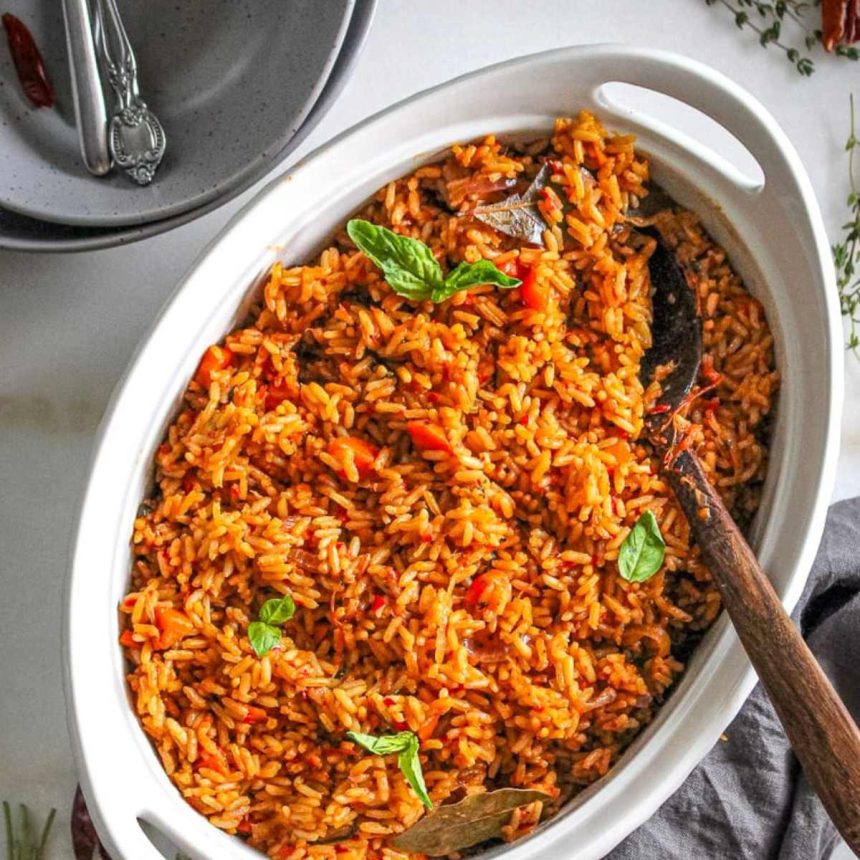A recent report by SBM Intelligence, a geopolitical intelligence platform, has revealed that the cost of preparing a popular Nigerian dish, Jollof rice, has increased by 29.3% since October. According to their report titled “The SBM Jollof Index Q1 2024: Crisis at the table,” the cost has risen from N13,106 in October to N16,955 in March 2024.
The SBM Jollof Index monitors the cost of preparing a pot of Jollof rice for a family of five across 13 markets in six geopolitical zones. The data collected helps in measuring inflationary trends in the country. The increase in food prices, particularly Jollof rice, can be attributed to various government policies, such as the removal of fuel subsidies, among others, which have contributed to the overall inflation and economic challenges in Nigeria.
The rising costs of essential goods, including staple foods like Jollof rice, have significantly impacted the purchasing power of many Nigerian citizens, making it increasingly difficult for households to afford daily meals. This issue is further exacerbated by the country’s annual inflation rate, which reached 33.20% in March, according to the National Bureau of Statistics. The food inflation rate during the same period rose to 40.01%, a 15.56% increase compared to the previous year.
SBM Intelligence’s report highlights that Nigeria faced one of its worst food crises between October 2023 and March 2024. During this period, the cost of preparing a pot of Jollof rice increased by 29.3%, from N13,106 in October to N16,955 in March 2024. The primary driver of this increase was the depreciation of the Naira, which rose from a monthly average of N796 to a dollar in October 2023 to over N1,513 in March 2024. This depreciation severely affected food affordability, as Nigeria relies heavily on food imports to meet its demand.
For instance, the price of a bag of rice increased from about N56,000 in October 2023 to approximately N87,000 in the first week of March 2024. Various factors, including conflicts in food-producing regions, reduced arable land, climate variability, and increased energy costs (electricity and fuel), contribute to the ongoing rise in food prices. Although interventions were implemented to alleviate the pressure faced by Nigerians, less than a quarter of the population benefited from these efforts, casting doubt on their effectiveness and sustainability.
The report emphasizes that the food crisis is unlikely to subside soon, as rising prices contribute to malnutrition, crime, and other social issues. To address this challenge, strategic planning is needed to ensure that food remains both affordable and accessible for the population.
To address the ongoing food crisis in Nigeria, the SBM Intelligence report suggests resolving ongoing conflicts and transitioning to mechanized agriculture as crucial steps towards a sustainable solution. The escalating prices of staple foods, such as rice, have had a significant impact on Nigerians, with alternatives like spaghetti also becoming increasingly unaffordable.
This situation has led to many people skipping meals, which can have severe consequences, particularly for children. When children miss meals, they may become restless, struggle to focus in class, and experience negative effects on their brain development. Adults, too, suffer from malnutrition, resulting in increased fatigue and a diminished ability to compete with better-fed peers in more developed countries.
As the food crisis continues to unfold, the risk of crime increases as people become desperate to meet their basic needs. This highlights the importance of implementing long-term strategies to combat food insecurity and its far-reaching effects on individuals and society. By addressing the root causes of the crisis and promoting sustainable agricultural practices, Nigeria can work towards ensuring food affordability and availability for its citizens.





